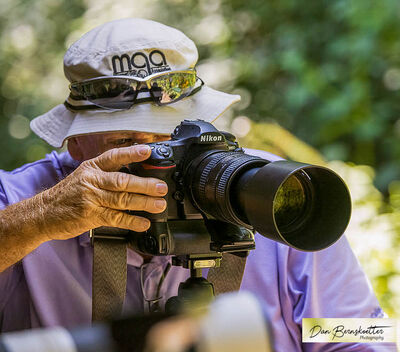Should I buy a full-frame camera body?
Aug 16, 2012 08:34:53 #
francesca3
Loc: Sausalito, CA
When I first bought my Nikon D90 I did not really understand the difference between full-frame and crop-sensor camera bodies. Money was a factor, plus I wanted then to shoot primarily wildlife (still do but now also more).
Have had a very steep learning curve and prefer doing anything to do with photography over just about everything else.
Now I wish I'd bought a full-frame camera body and although I do love the camera I have, I am wondering if I should start to save for another camera body ---> a full-frame one.
My next question is this: Will my lenses be useable on both cameras?
Here follows what I have:
a Nikon 70-200 f2.8;
a 1.4 teleconverter;
a Tamron 200-500 f5-6.3;
a Nikon 55-200 f4-5.6;
and
a Nikon 18 -55 f3.5 - 5.6
I know that I can do the research online, (and I shall), but with all of your wonderful UHH voices, I am interested to hear your thoughts.
Have had a very steep learning curve and prefer doing anything to do with photography over just about everything else.
Now I wish I'd bought a full-frame camera body and although I do love the camera I have, I am wondering if I should start to save for another camera body ---> a full-frame one.
My next question is this: Will my lenses be useable on both cameras?
Here follows what I have:
a Nikon 70-200 f2.8;
a 1.4 teleconverter;
a Tamron 200-500 f5-6.3;
a Nikon 55-200 f4-5.6;
and
a Nikon 18 -55 f3.5 - 5.6
I know that I can do the research online, (and I shall), but with all of your wonderful UHH voices, I am interested to hear your thoughts.
Aug 16, 2012 08:47:56 #
As I understand it, the lenses will function on a full-frame camera such as the D800, but will provide a cropped image. Someone please correct me if this isn't accurate.
Aug 16, 2012 08:56:11 #
If you shoot primarily wildlife ask yourself if the loss of "reach" with your lenses on a full-frame body is compensated for by the improved image quality. Your 200mm zoom on your D90 has the angle of view of a 300mm on a full-frame body. Just askin'!
Aug 16, 2012 09:11:18 #
francesca3
Loc: Sausalito, CA
Designerfin wrote:
If you shoot primarily wildlife ask yourself if the loss of "reach" with your lenses on a full-frame body is compensated for by the improved image quality. Your 200mm zoom on your D90 has the angle of view of a 300mm on a full-frame body. Just askin'!
Yeah, that is a good thing.
But now I am becoming interested in photographing other things too, like architecture, landscapes, portraits, city life.
AND, now that you've mentioned that there is "improved image quality" on full-frame camera bodies ---> OMGosh! That, too?
Aug 16, 2012 09:45:31 #
There are a number of things to consider, and this always comes down to your goals, the kinds of images you capture and the type and size of prints you intend to make.
The lens factor is to be considered slightly. Cropped sensor versus full frame and the difference in magnification with the same lens. And if you have any EF-S lenses, they will be useless with the full-framed camera.
Bigger factors are the following:
Noise. What kinds of things do you shoot and is noise a big factor for you? Full framed cameras, in themselves, aren't necessarily lower in noise. However, they can be.
Understand that it is complicated because in most cases, the full-framed cameras have a higher megapixel sensor. If it were the same megapixel, they would definitely be lower noise.
Consider that a big reason for the noise in the first place is the proximity of pixel cells on the sensor. With the same megapixels, but a bigger sensor, the cells have a little more room and so that alone will produce less noise in an image that might otherwise have a lot of noise.
However, because the newer cameras and the full-framed cameras all have higher megapixels, you have to do a little bit of math to compare, and you mostly have to step inside a camera shop and test out a new camera or two. Take a card for making your captures, and don't worry about dark images when shooting in the store. Those dark images are what will show the noise and if you take the same shots with different cameras, as well as your present crop sensored camera, then you will be able to see the difference.
Another factor is if you intend to make any large prints, poster sized, etc. With a full-framed camera and slightly more megapixels, you can more easily print the larger images without seeing any quality degradation.
What are your goals? Let that be your decision path, not the technology.
The lens factor is to be considered slightly. Cropped sensor versus full frame and the difference in magnification with the same lens. And if you have any EF-S lenses, they will be useless with the full-framed camera.
Bigger factors are the following:
Noise. What kinds of things do you shoot and is noise a big factor for you? Full framed cameras, in themselves, aren't necessarily lower in noise. However, they can be.
Understand that it is complicated because in most cases, the full-framed cameras have a higher megapixel sensor. If it were the same megapixel, they would definitely be lower noise.
Consider that a big reason for the noise in the first place is the proximity of pixel cells on the sensor. With the same megapixels, but a bigger sensor, the cells have a little more room and so that alone will produce less noise in an image that might otherwise have a lot of noise.
However, because the newer cameras and the full-framed cameras all have higher megapixels, you have to do a little bit of math to compare, and you mostly have to step inside a camera shop and test out a new camera or two. Take a card for making your captures, and don't worry about dark images when shooting in the store. Those dark images are what will show the noise and if you take the same shots with different cameras, as well as your present crop sensored camera, then you will be able to see the difference.
Another factor is if you intend to make any large prints, poster sized, etc. With a full-framed camera and slightly more megapixels, you can more easily print the larger images without seeing any quality degradation.
What are your goals? Let that be your decision path, not the technology.
Aug 16, 2012 09:51:27 #
mremery wrote:
As I understand it, the lenses will function on a full-frame camera such as the D800, but will provide a cropped image. Someone please correct me if this isn't accurate.
Only the DX lens, on a D800 it goes from 36mp to 15mp with a DX lens.
Aug 16, 2012 10:00:51 #
francesca3
Loc: Sausalito, CA
les_stockton wrote:
There are a number of things to consider, and this... (show quote)
This is really good information.
I have no EF-S lenses.
The noise info is really interesting: Megapixels need to be considered when buying a full-frame camera ---> still trying to wrap my head around this: "Understand that it is complicated because in most cases, the full-framed cameras have a higher megapixel sensor. If it were the same megapixel, they would definitely be lower noise. Consider that a big reason for the noise in the first place is the proximity of pixel cells on the sensor. With the same megapixels, but a bigger sensor, the cells have a little more room and so that alone will produce less noise in an image that might otherwise have a lot of noise."
Yes, I would like to be able to make prints larger than the standard 8x10s. (Really large, like 3' x 4' would be great.) I thought that taking tack-sharp photos would insure that capability but now I am thinking maybe not, maybe not at all.
Aug 16, 2012 10:04:36 #
francesca3
Loc: Sausalito, CA
Rufe wrote:
Only the DX lens, on a D800 it goes from 36mp to 15mp with a DX lens.
mremery wrote:
As I understand it, the lenses will function on a full-frame camera such as the D800, but will provide a cropped image. Someone please correct me if this isn't accurate.
Only the DX lens, on a D800 it goes from 36mp to 15mp with a DX lens.
Are you serious? (Of course you are.) So, if I understand you correctly, you are saying that my DX lenses, when used on an FX camera, the recorded megapixels will be diminished bigtime?
You also said that using DX lenses on FX cameras capture cropped images? That would be like using a DX camera in the first place, yes?
Aug 16, 2012 10:10:52 #
francesca3 wrote:
You also said that using DX lenses on FX cameras capture cropped images? That would be like using a DX camera in the first place, yes?
You also said that using DX lenses on FX cameras capture cropped images? That would be like using a DX camera in the first place, yes?
Using a DX type lens on a full frame body WILL result in turning that body into a DX type sensor image as the lens will not project a full image onto the sensor, the lens is too small in diameter. Any lens that has DX in its despriptive title will have that effect. If the lens' title does NOT have DX in it, then it is a Full Frame lens and will project an image over the entire full frame sensor. This much preferred if you go to an FX body.
I have never bought DX lenses, even when I was shooting my original D1 body, as DX lenses seem to me to be a waste of money since I always have shot film alongside my digital and DX lenses do not work on film bodies worth a crap.
DX lenses were developed simply as a way for the manufacturers to save money on glass optics in those lenses since the smaller cropped sensor did not use all the image projected by a film lens anyway. This saves the manufacturers a LOT of money on glass, yet the DX lenses are not much cheaper than their FX counterparts. This, to me, just equates into a larger profit margin for the manufacturers, and I think camera and lens prices are high enough as it is and a larger profit does not need to be coming out of my wallet.
Aug 16, 2012 10:17:10 #
francesca3 wrote:
Yes, I would like to be able to make prints larger than the standard 8x10s. (Really large, like 3' x 4' would be great.) I thought that taking tack-sharp photos would insure that capability but now I am thinking maybe not, maybe not at all.
Yes, I would like to be able to make prints larger than the standard 8x10s. (Really large, like 3' x 4' would be great.) I thought that taking tack-sharp photos would insure that capability but now I am thinking maybe not, maybe not at all.
I would strongly suggest taking a card into a camera store and trying a couple out. Then take your card home, pull the images up on your computer and check out how sharp they are, and do some comparisons. I have a general feeling that you will be pleased.
When I mentioned EF-S lenses, I was thinking Canon, because I'm a Canon shooter. I would think the same would generally be applied to the equivalent of the Nikon lenses, which in your case, if you have lenses specifically designed for cropped sensors, then I would suggest switching out to lenses that are not specific to cropped. Only one of my lenses is made specifically for a cropped sensor, so when I do finally make the jump to a full-framed camrea, I only have to switch out one lens.
Aug 16, 2012 10:23:22 #
Nikon full frame bodies accept the DX lenses, but Canon full frame bodies do not accept EF-S lenses. That said, I recently bit the bullet and went to a FF body. I couldn't be more pleased. Not is pix quality much better, there is a plethora of great additional capabilities in the advanced body. Better focus, HDR, more control and on and on..
Aug 16, 2012 10:38:26 #
photoninja1 wrote:
Nikon full frame bodies accept the DX lenses, but Canon full frame bodies do not accept EF-S lenses. That said, I recently bit the bullet and went to a FF body. I couldn't be more pleased. Not is pix quality much better, there is a plethora of great additional capabilities in the advanced body. Better focus, HDR, more control and on and on..
I don't doubt it. I'm kinda jealous. I hope that I'll be able to make a similar purchase in a year or so. Good luck with your's.
Aug 16, 2012 10:43:31 #
francesca3
Loc: Sausalito, CA
MT Shooter wrote:
quote=francesca3 br You also said that using DX ... (show quote)
Great information, thanks
Aug 17, 2012 05:09:13 #
depending on your needs either one will do you fine.it wasn't that long ago that there were no full frame digitals, and we did just fine.
Aug 17, 2012 06:49:21 #
Go FX if you can afford it. I have a D700 and it is fantastic. My main lens is 24-70 2.8. I know some photographers (pros) who shoot on ISO 1000 all the time with the D700 and no problem with noise whatsoever. I considered the D800 but with such a high mega pix count I would have had to upgrade all my computer gear to cope with the high count mp on each pic taken....this can be 75 meg per pic!
Using the D700, I can blow up to A1 no problem even with ISO at 1000, no noise probs.
Using the D700, I can blow up to A1 no problem even with ISO at 1000, no noise probs.
If you want to reply, then register here. Registration is free and your account is created instantly, so you can post right away.






